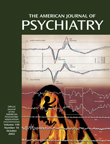Association of Depression With Viral Load, CD8 T Lymphocytes, and Natural Killer Cells in Women With HIV Infection
Abstract
OBJECTIVE: Clinical and epidemiology studies have implicated depression as a risk factor in the morbidity and mortality of many human diseases. This study sought to determine if depression was associated with alterations in cellular immunity variables—specifically, natural killer (NK) cells and CD8 T lymphocytes—in women with HIV infection. METHOD: Ninety-three women (63 HIV-seropositive, 30 HIV-seronegative) were studied as part of an ongoing longitudinal study conducted at two sites. Subjects underwent extensive clinical, psychiatric, and immunological evaluations. CBC counts and flow cytometry panels were conducted and NK cell activity assayed for all subjects; viral load was determined for HIV-seropositive subjects. RESULTS: The overall rate of major depression in the HIV-seropositive and HIV-seronegative women was 15.87% (N=10 of 63) and 10.00% (N=3 of 30), respectively. HIV-seropositive women had higher depressive symptom scores than did the comparison subjects (Hamilton depression scale: mean=8.62 [SD=7.26] versus mean=5.67 [SD=7.33], respectively). Both groups had similar anxiety scores. Depressive and anxiety symptoms were significantly associated with higher activated CD8 T lymphocyte counts and higher viral load levels. Major depression was associated with significantly lower natural killer cell activity, and depressive and anxiety symptom scores showed a similar correlation. CONCLUSIONS: Our findings provide the first evidence that depression may alter the function of killer lymphocytes in HIV-infected women and suggest that depression may decrease natural killer cell activity and lead to an increase in activated CD8 T lymphocytes and viral load. The rate of current major depression in these HIV-seropositive women (none of whom had current substance abuse) is approximately twice that reported for HIV-seropositive men. The rate is also consistent with studies of women with other medical illnesses and with a recent epidemiology study that associated depression with mortality in HIV-infected women with chronic depressive symptoms. Depression may have a negative impact on innate immunity. Examination of killer lymphocytes may prove useful in assessing the potential relationship between depression, immunity, and HIV disease progression in women.



